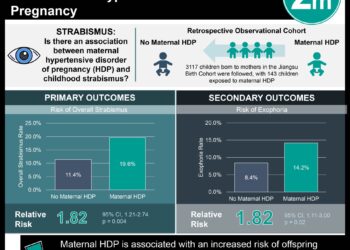Different gestational diabetes screening methods cause no difference for complications
1. The one-step screening method increased the incidence of diagnosis compared to the two-step screening method for gestational diabetes.
2. No significant difference was found between the two screening methods for risk of adverse perinatal outcomes, gestational hypertension, and preeclampsia.
Evidence Rating Level: 1 (Excellent)
Study Rundown: There is a lack of consensus on how best to screen gestational diabetes. Currently, the two acceptable screening options include the one-step approach or the two-step approach. This study compared the one-step approach to the two-step approach in two health systems with respect to maternal and neonatal outcomes. This trial found the one-step screening method increased the incidence of gestational diabetes diagnosis compared to the two-step approach. However, there was no additional risk of adverse perinatal outcomes, gestational hypertension, preeclampsia, primary caesarian section, or large-for-gestational age infants between the two approaches. Study limitations include a lack of participant adherence to the one-step approach, and sites using different thresholds for the initial test in the two-step approach. Nonetheless, this study’s results are significant and demonstrate a pragmatic comparison between two common screening methods for gestational diabetes.
Click to read the study in NEJM
Relevant Reading: Classification and diagnosis of diabetes: Standards of Medical Care in Diabetes – 2020
In-Depth [randomized controlled trial]: This randomized controlled trial randomized 23,792 pregnant women receiving care at Kaiser Permanente Northwest and Kaiser Permanente Hawaii. Women 18 years of age or older without pre-existing type 1 or type 2 diabetes were included in the study. Women who had a miscarriage, multiple gestations, or previous bariatric surgery were excluded from the study. Participants were randomized in a 1:1 ratio to either a one-step or two-step screening approach, respectively. Five primary outcomes were defined: 1) diagnosis of gestational diabetes; 2) a composite measure of perinatal outcomes; 3) large-for-gestational age infants; 4) primary caesarian section; and 5) gestational hypertension or preeclampsia. Gestational diabetes was diagnosed in 16.5% of women in the one-step group and 8.5% of women in the two-step group (unadjusted relative risk, 1.94; 97.5% confidence interval [CI], 1.79 to 2.11). No significant difference was found between the two groups with respect to other primary outcomes. These outcomes were a composite measure of perinatal outcomes (one-step group, 3.1%; two-step group, 3.0%; relative risk, 1.04; 97.5% CI, 0.88 to 1.23); primary caesarian section (one-step group, 24%; two-step group, 24.6%; relative risk, 0.98; 97.5% CI, 0.93 to 1.02), and gestational hypertension or preeclampsia (one-step group, 13.6%; two-step group,13.5%; relative risk, 1.00; 97.5% CI, 0.93 to 1.08). Altogether, compared to two-step screening, the one-step screening increased the incidence of diagnosis, but no difference was found in other predefined outcomes.
Image: PD
©2021 2 Minute Medicine, Inc. All rights reserved. No works may be reproduced without expressed written consent from 2 Minute Medicine, Inc. Inquire about licensing here. No article should be construed as medical advice and is not intended as such by the authors or by 2 Minute Medicine, Inc.




![Fluorophores enhance visualization for image-guided surgery [PreClinical]](https://www.2minutemedicine.com/wp-content/uploads/2015/01/FISH_13_21-75x75.jpg)

